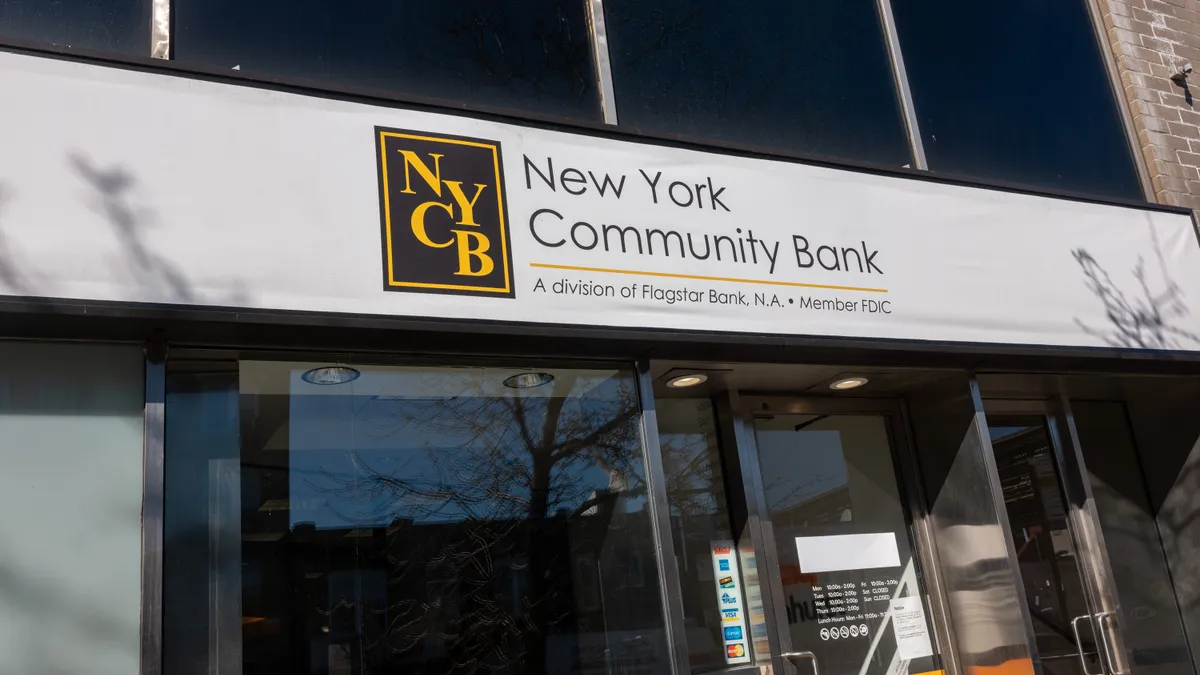Moody’s Investors Service cut New York Community Bank’s credit grade to junk Tuesday, propelling the bank’s stock to close at its lowest level since 1997.
“NYCB faces high governance risks from its transition with regards to the leadership of its second and third lines of defense, the risk and audit functions of the bank, at a pivotal time," Moodys wrote in a note seen by Reuters.
NYCB confirmed to the Financial Times on Monday that its chief risk officer, Nick Munson, “left the company in early 2024.” Additionally, the bank’s chief audit officer, Meagan Belfinger, was listed on NYCB’s leadership web page in October but not December.
NYCB, however, made no announcement regarding either departure.
JPMorgan analysts said Tuesday they were "surprised that the news of these departures, particularly for the CRO role, did not come from NYCB directly."
"NYCB's choice not to disclose the departures of key executives in times of stress will heighten investor concerns," the analysts wrote in a note seen by Reuters.
NYCB, meanwhile, issued a statement Tuesday with updated deposit and liquidity data — and perhaps an attempt to reassure investors.
“We have been engaged in an orderly process of bringing in a new chief risk officer and chief audit executive with large bank experience and we currently have qualified personnel filling those positions on an interim basis,” NYCB CEO Thomas Cangemi said in the release.
NYCB has a total liquidity of $37.3 billion, which exceeds its $22.9 billion in uninsured deposits, at a coverage ratio of 163%, the bank said.
Deposits at NYCB totaled $83 billion as of Monday, the bank said — up from $81.4 billion at the end of 2023.
Piper Sandler analysts Mark Fitzgibbon and Gregory Zingone, in a note Wednesday, called the figures “markedly better than almost anybody thought yesterday,” according to Bloomberg.
About 72% of the bank’s deposits are insured and collateralized, it said. By comparison, 10% or less of deposits at Signature and Silicon Valley Bank — two institutions that collapsed last year — were insured, according to The Wall Street Journal. That percentage was roughly 50% at First Republic, another bank that failed in 2023.
The bank arranged a presentation Wednesday and announced, too, it had appointed Alessandro DiNello as its executive chair, effective immediately. DiNello had served as CEO of Flagstar Bank from 2013 until NYCB acquired it in 2022 — at which point he became a non-executive chair.
NYCB said Wednesday that DiNello would “work alongside” Cangemi and senior leaders “to improve all aspects of the Bank's operations.”
“We have obviously been dealing with a very serious situation since our fourth-quarter earnings release,” DiNello said Wednesday, according to CNBC. “What I hope to do this morning is instill some confidence that this bank remains strong and will get itself back on the right track.”
NYCB has seen “virtually no deposit outflow” from retail branches, DiNello said.
Shareholder lawsuit
The announcement gave NYCB’s free-falling stock a slight uptick in pre-market trading Wednesday. By the close of the market Tuesday, NYCB stock had dropped 60% in a week, according to Yahoo Finance. The Moody’s downgrade initially pushed the stock even lower.
Some NYCB shareholders, meanwhile, sued the bank Tuesday in federal court in Brooklyn, alleging it defrauded them by failing to disclose — ahead of its fourth-quarter earnings report last week — that it would need to set aside $552 million for credit losses and cut its dividend by more than 70%.
Cangemi noted in his statement Tuesday that the Moody's downgrade “is not expected to have a material impact on [NYCB’s] contractual arrangements, adding that the bank’s “deposit ratings from Moody's, Fitch and DBRS remain investment grade.”
Cangemi and NYCB CFO John Pinto were named as defendants in the shareholders’ suit. Plaintiffs said the bank, since March 2023, has given an "unrealistically positive assessment of the Company and its financial well-being and prospects.”
NYCB’s fourth-quarter charge-offs stemmed mostly from two loans — both with ties to commercial real estate, a segment about which Moody’s warned Tuesday.
“NYCB’s core historical commercial real estate lending, significant and unanticipated loss on its New York office and multifamily property could create potential confidence sensitivity,” the investor service said, according to CNBC. “The company’s elevated use of market funding may limit the bank’s financial flexibility in the current environment.”
Beyond its CRE woes, NYCB’s acquisitions of Flagstar and, then last year, a sizable portion of Signature’s assets, propelled it past the $100 billion-asset threshold, meaning regulators will require it to hold more capital.
Additionally, the bank may need to sell $4 billion to $6 billion in debt to meet new debt requirements for regional banks — a prospect made harder with a Moody’s downgrade, Bloomberg Intelligence analysts said Tuesday.
NYCB’s market value has dropped to about $3.5 billion since last week’s earnings report, according to CNBC. That’s down from an August high of nearly $10 billion.






















